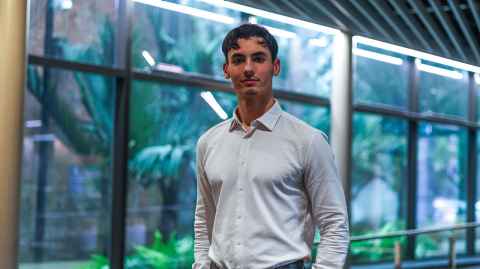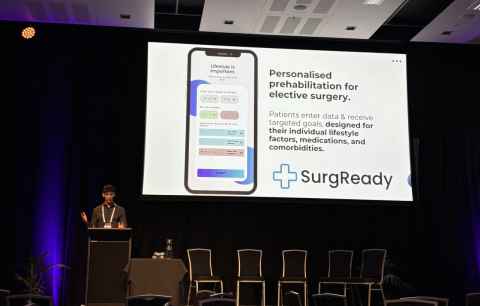Can tech fix surgery delays? One student thinks so
8 July 2025
When University of Auckland fourth-year medical student Ronan Payinda saw a patient’s surgery cancelled because they hadn’t stopped eating or adjusted their medications, something clicked.

Each year, thousands of surgeries are cancelled in New Zealand alone, and up to 30% of those cancellations are due to preventable patient-related factors. Research shows that even four weeks of prehabilitation including physical, mental, and nutritional preparation can significantly reduce cancellations and improve outcomes.
While most medical students focus exclusively on ward shifts, textbooks, and exams, Ronan is building a MedTech start-up alongside his hospital placements. His venture, SurgReady, is a digital platform designed to support patients through the often confusing and stressful lead-up to surgery. Rather than leaving patients overwhelmed in the final weeks before an operation, SurgReady aims to guide and empower them from the moment they’re added to a surgical waitlist.
SurgReady is a personalised platform that helps patients take the right steps like quitting smoking, managing medications, and meeting pre-surgery health targets well in advance of their procedure. It combines educational tools with automated reminders, tailored to both individual patient needs and hospital protocols.
“Clinicians can use the portal to input instructions months ahead,” Ronan explains. “The platform then sends patients reminders at the right time like when to stop blood thinners or come off certain medications. It reduces cancellations and eases the burden on busy surgical teams.”
The platform also includes clinician-facing features, allowing doctors to flag medication-related risks or timeline-sensitive actions. The result? Fewer last-minute shocks, better-prepared patients, and a more efficient health system.
From clinical frustration to entrepreneurial action
Ronan participated in the Velocity programme, delivered by the Business School’s Centre for Innovation and Entrepreneurship (CIE). As a Velocity $100K Challenge entrant, Ronan learned to focus on the problem before the product: Testing assumptions, talking to users, and refining his approach through feedback. “CIE really pushed us to think about the problem before the product,” he says. “They challenged us to go out, talk to users, and test assumptions. That made all the difference.”
What began as a rough idea is now an early-stage prototype, with a login system and clinician dashboard. The team is working toward an MVP and is actively seeking intermediate to senior software engineers to join their mission.
Ronan is also exploring how AI can be used within SurgReady, specifically in guiding lifestyle interventions like weight loss or nutrition planning, with strict clinical boundaries in place to ensure safety.
Asia-Pacific thinking, global potential
In parallel, Ronan is also a member of the Asia New Zealand Foundation’s Leadership Network - an experience that expanded his thinking beyond local systems. He believes New Zealand must recognise its place within the Asia-Pacific region, not just geographically but also geopolitically.
“Science, healthcare and innovation, these are just as important in building international relationships as trade or policy,” says Ronan. “Health innovation should never happen in a bubble. It benefits from knowledge sharing across borders. Whether it's China, India, or Australia, there’s so much we can learn from our neighbours.”
This perspective continues to shape how he sees SurgReady’s potential, not just as a local tool, but as part of a broader global conversation around healthcare innovation and collaboration.
A future doctor, and a founder

Although deeply invested in SurgReady, Ronan remains committed to practising medicine. “I don’t see it as an either-or,” he says. “Doctors can also be innovators, researchers, or advocates. All of these roles can make healthcare better.”
For Ronan, medicine and MedTech are not competing paths, they’re complementary. His clinical work informs his start-up, and vice versa.
His advice for other students considering innovation?
“Value your inexperience. As students, we sit between the system and the patient. That perspective is powerful.”
He encourages others not to wait for the perfect moment or idea. “Start with a problem you care about. Then build from there.”
“Don’t be afraid to fail. Every setback is a lesson. And every lesson brings you closer to building something that really matters.”
Contact
Questions? Contact the Centre for Innovation and Entrepreneurship for more information.
E: cie@auckland.ac.nz